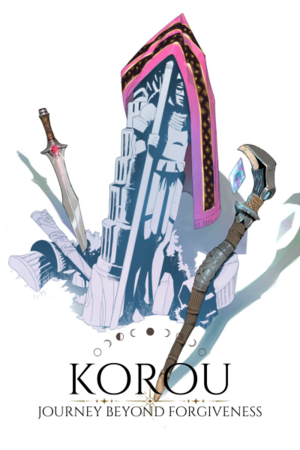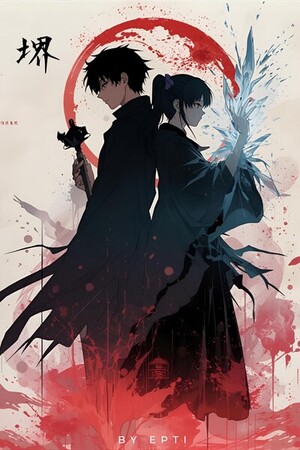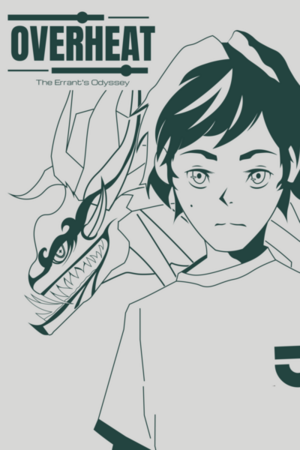Chapter 3:
3- INTERMISSIONS AMONG IMMORTALS
What the Stars Couldn't Fix
A new presence permeated the waves, the water no longer an element but an extension of her will. Eyes the colour of sea, now narrowed in anger, her trident glowed faintly in the dark, and when she spoke, the whole water carried her voice, pressing down on Adi from all sides.
“You burn what you do not understand,” Poseidon said through his vessel, Ptolema, each word heavy enough to break stone. “Child of blue fire. Do you think this is power? To make seas boil and lives perish?”
Adithya’s knuckles whitened on the khanda. The god’s fury pressed against him, the weight of tides, of centuries of drowned kingdoms.
“You are an upstart. A flicker. The ocean has drowned fires greater than you. And yet—you dare bring ruin into my depths?” Ptolema’s trident shifted, as God and vessel spoke as one. “I will show you what the water does to sparks that rage without shame.”
The boiling water enveloped them as two powers, two entities collided, screaming for dominance.
“I am not here to be broken.”
And the lake erupted into war.
The waters shuddered as Chinnamasta’s blade and fire bent to his will, every clash of azure against the earthshaker’s trident crashing down, every strike a contradiction in itself. His blade carved fire into the murky depths as her trident caused the seabed to crack, the weight of oceans condensed into one furious vessel.
“I came here to protect,” Adi shot back, “To save those you ignore!”
Ptolema laughed, with the deep voice of her God echoing, a sound akin to chilled water. “I am the ocean! Do you think your petty fire can choke me?”, she slammed the trident into the lakebed, geysers shooting forth from cracks. “A God vessel who has let mortal rage shackle him has no right to even gaze at me.”
Adithya countered with a spinning slash, the flames flaring into a dome around him. “I don’t choke—I cleanse!”
“You don’t cleanse, you take! Ruin is all you know,” Poseidon’s voice rumbled like thunder, “A mortal wrapped in power you cannot wield… a child trying to bear the weight of gods!”
Adithya spat, gripping his sword tighter. His voice trembled, but it carried through the water, sharpened by defiance. “If destruction is all I’ve been given… then I’ll wield it until it carves a place for me.”
Ptolema and Adithya plunged towards each other once again. For a heartbeat, it was as if fire and ocean would consume each other entirely—until an arrow of gold split the inferno.
Hachiman’s vessel stepped forward, a woman with black eyes as sharp as the sharpest blade. “You destroyed a town weeks ago!” Her arrows lit with divine fire, aimed at Adithya. “And now you dare upset the balance again?”
“I saved them, Tomoe!” Aadithya shouted, blue flames flaring defensively. “I—”
“You nearly razed the entire village!” Hachiman’s, no, Tomoe’s voice rang like a bell. She leapt into the lake, arrow fletched, taught. “I will not let your pride endanger more lives!”
Ptolema roared, serpentine water striking at both. “You see now, boy! This is why mortals should know their place!”
Adithya met the waves with fire. “I am no mere mortal!”
“No mere mortal indeed,” Hachiman growled, “A boy who wears the guise of a man and taints the name of the headless goddess.”
The lake boiled into a frenzy as flame and fluid collided, Tomoe and Ptolema pressing down on Adi and causing him to retreat. A sudden burst of celestial bronze cut across the ember-strewn tides and the arrows, landing between the three. A familiar gorgon shield manifested beside, freezing them in place.
The scent of lilies overpowered the scent of blood, sweet like honey, smooth and loving to the touch as petals, soft yet cold, blowing from the Bay of Bengal in the southwest to the current desolate version of Tripura where the trio now stood, on a mesh of desolation painted by machinery and nanotech, a future no one had asked for.
“Like a child, throwing a tantrum when things don’t go his way,” the voice said, soothing like a mother’s yet mocking like a woman drunk on her ego. “What a risible state you have ended up in. Truly, a Goddess of contradictions could’ve chosen no better contradiction to be her host than this man who destroys everything in the name of salvation.”
An ivory-haired, gold-eyed girl landed on the battlefield, her feet supported by the same lilies that touched the earth.
“Finally, a woman who speaks sense.” Ptolema’s proud voice rang, “Greetings, Lady Hera.”
Hera regarded her with a nod, her eyes softening at Tomoe, but her eyes sharpening yet again at the sight of Adithya.
“I was trying to help.” Adithya weakly defended, but a sharp wave of her hand shut him up.
“And by helping, you meant razing a whole town and boiling a lake? Does salvation involve wounding those you wish to protect?” She stifled a laugh, “Pathetic.”
Tomoe bowed at Hera’s words, “His intentions are bound by honour, but his methods speak of nothing of that sort.”
Hera lifted her chin, her words like a mother scolding wayward children. “Bearer of the headless goddess, a child may strike out in anger, but a god must rise above such impulses. Yet, you, being an adult, are to grow beyond the tantrums of boyhood.”
Adithya’s flames sputtered around him, his jaw clenched as though her words weighed more than any blow Poseidon had struck.
The gorgon-headed shield glowed, and from within emerged an armoured man, his jawline sharp, his eyes grey. He held the spear with adequate force, striking it, a shockwave waking the ground.
“You speak of restraint, of order, of the wisdom of a mother. Yet how many times have you abandoned such virtues yourself? You threw Hephaestus—your own child—from Olympus because you found him unsightly. You, who call yourself the guardian of family, rejected your own blood.”
The words struck harder than Adithya’s flames. Ptolema stiffened, Tomoe frowned, but Hera’s eyes flared.
Athena pressed on, voice cold steel. “You curse mortals with fury unmatched. You lash out in vengeance again and again, leaving scars that no prayer can mend. Do not speak of unrestrained anger as though you are above it. You are its very embodiment. Do not preach peace and harmony when your own hands are stained, endangering our pantheon like the fruits of a falling olive tree.”
Hera’s eyes widened as a sharp gasp escaped her lungs, “You insolent wench! Childless as your Goddess, you have no right to speak of children when you yourself have lived in isolation, not knowing what it means to nurture. I, however, speak from experience. Unlike you, I come from a place of—”
“—pride?”
“Of care!” Hera hissed. “You, who know nothing of the weight of binding, of keeping family together? You speak from distance, from detachment.”
Ptolema slammed his trident into the earth, waves lashing high. “Athena, your tongue sharpens too far. Adithya burns worlds because he cannot master himself. Will you protect that?”
“And what will you do, mermaid?” Athena snapped back. “Continue to rage at mortals for not bowing low enough, for daring to breathe upon your waters? If Adithya’s flaw is anger, yours is hubris or sloth. You didn’t heed the cries of the mortals. You didn’t jump to their rescue. He tried. He felt the best. He did what you should’ve done, lord of the tides. He fought your beast when you did not, Poseidon.”
He turned around, facing Tomoe with narrowed eyes, “And you, Hachiman, rebuild with one hand while destroying with the other. Are you blind to the truth? Adithya tried to help.”
Poseidon bristled underneath Ptolema’s form, the way she called that name hurting like daggers to the solar plexus.
Tomoe nodded toward Poseidon, hiding her own guilt. “She’s right. He may be reckless, but he acted. And in the end, the monster is defeated, isn't it?”
Adithya’s chest heaved, flames curling upward like questions in the air. “I only wanted to help… I—”
Hera stepped closer, eyes narrowing. “You wanted to help? You destroyed more than you saved. Pride, fire, ruin. That is all you leave behind.”
Athena stepped forward. The gods bickered, voices rising like storms. Athena, in the heat of it, turned and struck Adithya across the face.
“Control yourself, Adithya Naicker! You are not your flame. Do not give them more reason to hate you.”
Tomoe raised her bow, voice controlled but stern. “Enough. This is pointless. The man is dangerous. He needs to be judged, not coddled.”
The air crackled with tension, flaming fists dimming under their words as he stayed silent. As if summoned by the storm itself, the sky shimmered with a golden hue. Vishnu appeared — smiling, radiant, his presence warm like laughter under the sun, his long elf ears twitching playfully. He clapped lightly, as though to break the tension.
“My, my,” he chuckled, “one would think you are all mortals at market, shouting over whose fruit is sweeter.” He tilted his head, gazing at Adithya with curiosity, then back at the Gods. “But no fruit is judged by its first bite, is it? Some ripen late. Some sour before sweet. And yet, each deserves a taste before you cast it aside.”, he said, words dripping with diplomatic wisdom. “Such passion, such eloquence, all wasted on shouting. Truly, my friends, this is how gods spend their hours? Poseidon drowning in pride, Hera spitting fire, Athena nursing strays, Hachiman lost between bow and plow…delightful, really.”
He stepped closer, gaze turning sharper, though the smile never left.
“That man is dangerous, Lord Vishnu. He isn’t one to leave unchecked.”
“And yet, you shun and shout and scream, not lifting a hand to aid him when his fight is so desperate. Why is a bear fighting a hunter considered a monster even when the man has killed several of its kin?”
“But this man is no bear, nor hunter.” Hera said, “He is a God. And Gods are greater than anything mortal.”
“Ah, Lady Hera, you forget that we are but creations of mortal minds. Our power is real, yet we are bound to mortal vessels. If Prometheus crafted humans in our image, then humans serve as a mirror to our own imperfections. Adithya is not the monster here. He is a mirror. He shows us what happens when divinity is given to those still human enough to break. The moment we forget our roots, we serve to look like children given flaming swords to play with.”
“You call this play?!” Ptolema shrieked, “He destroyed a whole piece of land, for what?”
“Mm, yes, yes,” Vishnu murmured, as if tasting honey. “And you, mighty lord of the ocean, rise to quarrel with him like a fisherman guarding a single net. How strange. Where is the deep, endless patience of the sea you boast of? All I hear is a storm with no fish to catch.”
Tomoe smirked faintly, though her grip on her bow never loosened. Hera stepped forward, chin high. “And what of you? Shall you protect this mortal, too? He has brought only ruin. Even Athena won’t deny it.”
Athena adjusted his helm, lips curved just slightly. “I deny nothing… but I see much he has yet to learn. Growth deserves a chance, even if the soil is scorched. And hence, I shall walk his path for wisdom should be available to all.”
Vishnu’s laugh was soft, almost hidden under the hiss of receding waves. He looked from one god to the other, eyes glimmering like a trickster’s.
“Hera, your pride is a crown heavier than Olympus itself… yet you wear it as though no neck might break. Poseidon, your wrath boils like a kettle left too long on the fire—does it serve anyone when it spills over? Hachiman, so stern, so diligent…yet is this truly honour? Quelling a flame that burns with no precision with a flame greater than the embers that started the inferno?”
His gaze drifted, finally, to Adithya, and his smile warmed. “And you, little flame… look at you, striking matches in a forest, surprised when the trees catch.”
Adithya clenched his fists, jaw tight, but his voice cracked faintly. “…I never meant—”
“Yes, yes,” Vishnu interrupted, waving a hand with mock gentleness. “Never meant. And yet, it happened. A man with good intentions, but terrible execution, is still called a monster despite the origins of his vision.”
For a moment, the silence stretched, Vishnu's eyes searching his, until he clapped his hands together, sudden and merry.
“So! Will you gods stand here forever, shouting like roosters at dawn? Or shall we remember that divinity looks rather silly when it stoops to quarrel with one who has strayed from his path?”
Ptolema growled, Hera narrowed her eyes, Athena only chuckled under her breath… and still no one could tell whether Vishnu had mocked them, scolded them, or simply found the whole affair amusing. He disappeared, leaving the mortal, the elf named Devendra, to speak in his stead. Yet, like his God, the man who was on his last legs, still as young as he used to be, yet tired in mind to hold divinity for any longer, had the same smile plastered to his face.
“So, shall we scream until our worshippers lose faith in us—or shall we act like gods and hold a tribunal?”




Please sign in to leave a comment.